|
|
|
Sort Order |
|
|
|
Items / Page
|
|
|
|
|
|
|
| Srl | Item |
| 1 |
ID:
169414
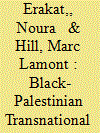

|
|
|
|
|
| Summary/Abstract |
This introductory essay outlines the context for this special issue of the Journal of Palestine Studies on Black-Palestinian transnational solidarity (BPTS). Through the analytic of “renewal,” the authors point to the recent increase in individual and collective energies directed toward developing effective, reciprocal, and transformative political relationships within various African-descendant and Palestinian communities around the world. Drawing from the extant BPTS literature, this essay examines the prominent intellectual currents in the field and points to new methodologies and analytics that are required to move the field forward. With this essay, the authors aim not only to contextualize the field and to frame this special issue, but also to chart new directions for future intellectual and political work.
|
|
|
|
|
|
|
|
|
|
|
|
|
|
|
|
| 2 |
ID:
169418


|
|
|
|
|
| Summary/Abstract |
This essay questions a key takeaway from the Ferguson/Gaza convergence that catalyzed the current wave of Black-Palestinian transnational solidarity: the idea that “equivalence,” or a politics of analogy based on racial or national identity, or racialized or colonial experience, is the sole or primary grounds for solidarity. By revisiting three recent spectacular moments involving Black intellectuals advocating for Palestine—Michelle Alexander's op-ed in the New York Times criticizing Israeli policies, CNN's firing of Marc Lamont Hill, and the Birmingham Civil Rights Institute's initial decision to deny Angela Davis its highest honor—this paper suggests that their controversial positions must be traced back to the post-1967 moment. The convergence of Black urban rebellions and the June 1967 Arab-Israeli war birthed the first significant wave of Black-Palestinian solidarity; at the same time, solidarities rooted in anti-imperialism and Left internationalism rivaled the “Black-Jewish alliance,” founded on analogy of oppression rather than shared principles of liberation. Third World insurgencies and anti-imperialist movements, not just events in the United States and Palestine, created the conditions for radically reordering political alliances: rather than adopting a politics of analogy or identity, the Black and Palestinian Left embraced a vision of “worldmaking” that was a catalyst for imagining revolution as opposed to plotting coalition.
|
|
|
|
|
|
|
|
|
|
|
|
|
|
|
|
| 3 |
ID:
169421
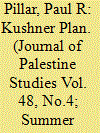

|
|
|
|
|
| Summary/Abstract |
The U.S. administration's Israeli-Palestinian “peace plan,” under President Donald Trump, has so far yielded only an inconclusive talkfest about economic development. The underlying rationale of the plan—that economics must come before any addressing of core political issues—is fundamentally flawed for several reasons. The biggest impediments to Palestinian economic development stem from aspects of the Israeli occupation that would continue under the plan, which rejects a two-state solution and is a slightly revised and renamed version of the current arrangement of limited Palestinian autonomy under Israeli domination. The plan flows directly from the Trump administration's policy of acquiescing in the preferences of the right-wing government of Israel. Accordingly, the political portion of the plan is indefinitely delayed and might never be announced. Keeping the full plan under wraps serves the Israeli government's purpose of holding out the promise of—but never delivering—peace with the Palestinians, while more facts are created on the ground.
|
|
|
|
|
|
|
|
|
|
|
|
|
|
|
|
| 4 |
ID:
169419
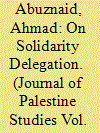

|
|
|
|
|
| Summary/Abstract |
Delegations of Black revolutionary leaders to the Middle East were a prominent feature of Black-Palestinian transnational solidarity at the height of the worldwide revolt against imperial domination in the decades following World War II. Though they never ceased, delegations have become a critical feature of solidarity practices once more. Unlike their historical predecessors, today's delegations are no longer organized in collaboration with the official organizations of the Palestinian national movement but between individuals and/or social justice organizations. In addition, the delegations are no longer unidirectional, as they now encompass visits by activists from Palestine and other “Palestinian geographies” in the Middle East to the United States. Finally, recent delegations have included one by indigenous youth to Palestine as well as several from the African continent to the Middle East. This roundtable, featuring leading organizers of recent delegations, aims to reveal the ruptures and continuities of a historical legacy. We intend for this roundtable to serve as an archive and a site of knowledge production.
|
|
|
|
|
|
|
|
|
|
|
|
|
|
|
|
| 5 |
ID:
169415


|
|
|
|
|
| Summary/Abstract |
This article examines early Palestinian engagements with multiple facets of the Black American struggle for freedom through a content analysis of influential Palestinian press outlets in Arabic prior to 1967. It argues that, since the 1930s, Palestinian intellectuals with strong anti-colonial views linked anti-Black racism in the United States to larger imperial and Cold War dynamics, and that they connected Black American mobilizations against racism to decolonization movements around the world. This article also examines Mahmoud Darwish's early analytical writings on race as a social construct in both the U.S. and Israeli contexts. Understanding these early engagements sheds light on subsequent developments in Black-Palestinian transnational solidarity and on Palestinian Afro-Arab cultural imaginaries.
|
|
|
|
|
|
|
|
|
|
|
|
|
|
|
|
| 6 |
ID:
169417
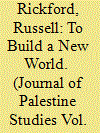

|
|
|
|
|
| Summary/Abstract |
This essay traces the arc of Black American solidarity with Palestine, placing the phenomenon in the context of twentieth-century African American internationalism. It sketches the evolution of the political imaginary that enabled Black activists to depict African Americans and Palestinians as compatriots within global communities of dissent. For more than half a century, Black internationalists identified with Zionism, believing that the Jewish bid for a national homeland paralleled the African American freedom struggle. During the 1950s and 1960s, however, colonial aggression in the Middle East led many African American progressives to rethink the analogy. In the late 1960s and the 1970s, African American dissidents operating within the nexus of Black nationalism, Pan-Africanism, and Third Worldism constructed powerful theories of Afro-Palestinian kinship. In so doing, they reimagined or transcended bonds of color, positing anti-imperialist struggle, rather than racial affinity, as the precondition of camaraderie.
|
|
|
|
|
|
|
|
|
|
|
|
|
|
|
|
| 7 |
ID:
169416
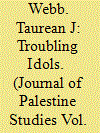

|
|
|
|
|
| Summary/Abstract |
This article claims that insofar as they continue to omit analyses of colonialism and racialization, retellings of the biblical Exodus and of twentieth-century Black-Jewish relations—two massively significant narratives in the U.S. Black Christian imaginary—will inevitably continue to fuel the Zionist impulse that prevents much of Afro-Christianity from intentionally engaging Palestinian justice. Furthermore, the religious trope of chosenness, along with the dominant narration of the European Jewish Holocaust moment, have provided a politico-ethical basis for a unique type of dispensation that filters the two aforementioned retellings to ultimately deselect non-Jewish Palestinians from a recognizably complex humanity. The tools of the Black radical tradition, however, coupled with a reimagining of coalitional politics, carve out a radical Black Christian sensibility that is best equipped to speak to the devastations of military occupation and racist exclusion and forge life-giving relationships within the freedom struggles against them.
|
|
|
|
|
|
|
|
|
|
|
|
|
|
|
|
| 8 |
ID:
169420


|
|
|
|
|
| Summary/Abstract |
The Bahrain workshop and its associated economic plan are little more than elaborate smokescreens for U.S. president Donald Trump's political vision centered on the broader goals of normalizing Israeli occupation, consolidating the “Greater Israel” agenda, and effectively foreclosing Palestinian political aspirations. By working together with the government of Israeli prime minister Benjamin Netanyahu to redefine the conflict and do away with the traditional ground rules of the peace process, including the two-state solution, Trump is attempting to turn back the clock to the pre-1967 era when Palestinians were viewed mainly as an economic, humanitarian, and security problem rather than a political one. For Palestinians to effectively confront this unprecedented challenge, they will need to put their political house in order, including ending the debilitating political division between Fatah and Hamas, reviving institutional politics, and working to build a national consensus around a new strategy.
|
|
|
|
|
|
|
|
|
|
|
|
|
|
|
|
|
|
|
|
|